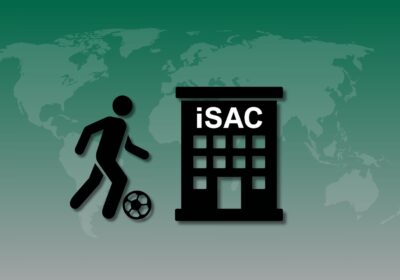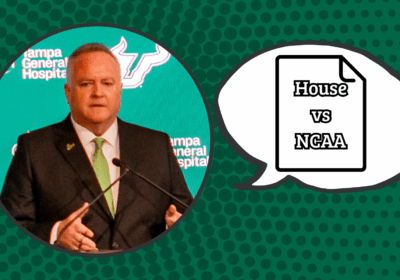OPINION: USF, UCF and the 2-for-1

The War on I-4 trophy isn't the only thing USF and UCF want. Both programs desire high-profile Power Five opponents, but only USF has been succesful at scheduling them recently. ORACLE PHOTO/BRIAN HATTAB
USF captured the attention of the college football world last week when it was announced the Bulls did what few non-Power Five programs have been able to do — schedule a home game against Alabama.
USF luring the Crimson Tide out of Tuscaloosa is a big deal.
Alabama has not played a road game against a non-Power team since 2003, when the Crimson Tide traveled to Hawaii in what was a de facto bowl game while the program was under NCAA sanctions. Prior to 2002, also at Hawaii for similar reasons, Alabama’s last non-Power road game came against Tulane in 1992.
Of course, the Bulls’ home game comes with a caveat: USF must travel to Tuscaloosa twice while the Crimson Tide will only roll into Raymond James Stadium once.
This type of deal, otherwise known as a two-for-one, is becoming common for Group of Five programs when scheduling marquee Power Five teams — and it isn’t popular with everyone in the AAC.
In response to USF announcing a two-for-one with Miami the week prior to the Alabama news, UCF Athletic Director Danny White was critical of USF’s acceptance of two-for-ones.
“It’s a precedent I don’t like being set in our conference for schools to start doing a lot higher volume of two-for-ones,” White said in an interview on Orlando’s WYGM-AM. “We’ve been successful, historically, of getting home-and-homes with Power 6 opponents, and I’d like to see our conference peers continue to do that as we intend to do.”
When taken at face value, White’s comments are accurate. The Knights have several home-and-home series scheduled with Power Five teams in the coming years and wrap up two in 2019 alone.
But not all Power Five teams are equal, and because of that, White’s argument doesn’t last.
The home-and-homes UCF wraps up this year are against Stanford and Pittsburgh. Stanford finished third in the Pac-12 North last season, and plays in a conference which hasn’t had a team in the College Football Playoff (CFP) since the 2014 season. Pittsburgh won the ACC Coastal in 2018 before being blown out by Clemson in the conference championship game, its first appearance in one since escaping the Big East after 2012.
Unfortunately for UCF, while it’s a solid lineup, it’s not going to be solid enough to help the Knights’ strength of schedule get where it needs to be, especially since the rest of UCF’s nonconference schedule consists of Florida Atlantic and Florida A&M.
It’s well documented what the CFP committee thinks about strength of schedule, after all.
“Play a good schedule, win your games, and you’re going to be in the hunt for the College Football Playoff,” CFP executive director Bill Hancock said regarding UCF’s chances at making the Playoff last season.
Because of the perceived inferiorness of the AAC — whether fair or not — USF’s and UCF’s schedules are never going to impress the powers that be in college football without a few big names on the schedule.
But, hindering UCF’s quest for the big names are two-for-ones. White may act like he doesn’t understand why he can’t get a home-and-home with teams like Florida, but there’s a pretty simple explanation of why big name programs offer two-for-ones: they can.
Make no mistake, USF and UCF need Florida, Miami and Alabama on their schedules more than the inverse. The CFP committee has made it clear playing in the ACC and SEC is enough and Alabama can play its traditionally laughable nonconference slate for the rest of eternity and still make the Playoff.
White’s views on two-for-ones are also driven by money. UCF has made it a point to schedule seven home games each season in an effort to sell more tickets.
“It’s opposite our scheduling model,” White said in the same interview on WYGM. “We’re scheduling the way we schedule to build our season ticket base, our revenue, build our budget and build our fan base.”
That’s fine. Different programs, with different stadium situations, can — and probably should — have different scheduling philosophies. But UCF’s clearly isn’t resulting in the national respect it thinks it deserves. Meanwhile, USF’s “wherever, whenever” method has precedent for that.
Some “old” timers — at least old as far as a program entering its 23rd season goes — remember the buzz USF received nationally in 2007 after it beat then No. 17-Auburn and followed it up with a home win a few weeks later against then-No. 5 West Virginia in front of a sold-out Ray Jay.
The road victory against Auburn was enough to get a previously unranked Bulls team to No. 23, marking the first time in program history USF entered the Top 25. USF eventually turned that appearance in the Top 25 into a No. 2 ranking by Week 7.
Then there was the 2009 victory against then-No. 18 FSU in Tallahassee and the 2011 win against then-No. 16 Notre Dame in South Bend. Both of those wins also got unranked USF teams into the Top 25.
The FSU game was part of a home-and-home series and West Virginia was a Big East home game, but none of those other teams ever paid a return trip to Raymond James Stadium.
Granted, this all happened during the days of the BCS and while the Big East was considered the equivalent of what we call Power conferences today, but USF’s strategy obviously worked back then.
Meanwhile, there’s no reason to believe UCF’s method of playing mid-tier Power programs in home-and-homes will ever pay off. It hasn’t so far, at least.
Going forward, USF is likely to have an advantage over its War on I-4 rival, at least when it comes to strength of schedule. If the Bulls can even pull off a few of these games against the monsters of college football, it’s going to do so much more good than UCF’s home-and-home with Pittsburgh ever did.







